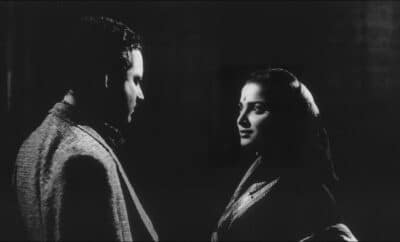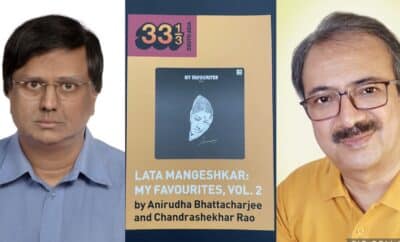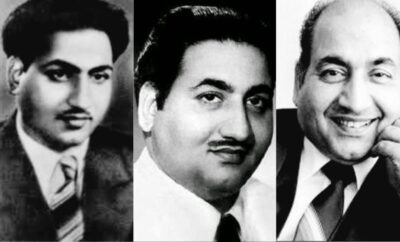Song Sketch
Teri Aankhon Ke Siva Duniya Mein – When The Eyes Mean The World – Chirag
Eyes have their own vocabulary. Sometimes it is difficult to read their language but at times you can understand the story that they narrate. Eyes have the capability of hiding a deep secret in them and still eyes are called as the windows to your soul and reflection of your spirit. To know that you are beautiful in someone else’s eyes makes you feel beautiful. Sometimes a romantic story begins with eyes, stays in those eyes and ends in those eyes. Sometimes those eyes mean the world to someone. Sometimes the eyes define the pain of separation and at times they become the pain of separation. And for those lovelorns Faiz Ahmed Faiz has written –
Mujhse pehli si mohabbat mere mehboob na maang
Maine samjha tha ke tu hai toh darakhshaan hai hayaat
Tera gham hai toh gham-e-dehar ka jhagda kya hai
Teri surat se hai aalam mein bahaaron ko sabaat
Teri aankhon ke siva duniya mein rakha kya hai…..
How beautifully and precisely he says that those eyes meant the world to him. A story goes that Noor Jehan had recited these lines in her own tune at a get together organised to celebrate the release of Faiz Ahmed Faiz from the prison in 1955. Everyone including Faiz, loved the rendition. The rendition got immense popularity and it was adapted as a full fledged song in a Pakistani movie, Qaidi (1962).
The lines are still very popular with so many artists like Zohra Sehgal, Surekha Sikri reciting the lines very recently. Talking about the lines, Majrooh Sultanpuri adopted just one line (with due permission) from the poem and made it into an independent, romantic song for Chirag (1969). The song still serves as an anthem to praise the beauty of the eyes.
Teri aankhon ke siva duniya mein rakha kya hai
Ye uthe subah chale, ye jhuke shaam dhale
Mera jeena mera marna inhi palkon ke taley….
Composed by the genius Madan Mohan in Raag Jhinjhoti, the song goes several notches up when we hear Mohammed Rafi sing it. There are 2 versions, male by Rafi and female by Lata Mangeshkar. Both the versions have different antaras and different moods. While the male version is a romantic one, the female version is stoic and sad. Expressions of both the singers in the respective versions is worth noting. Majrooh Sultanpuri being a champion creates the desirable mood for these versions.
Palkon ki galiyon mein chehre baharon ke hanste hue
Hai mere khwabon ke kya kya nagar inme baste hue
Ye uthe subah chale…..
Ajay (Sunil Dutt) sings of his future together with Asha (Asha Parekh). Her eyes being the centre of attraction, he praises them as if they mean the world to him. The extensive use of violins and guitar in this version hints towards the happiness of a couple in love seeing their future together, their dream of staying together coming true. Jhinjhoti, a light, playful Raag brings in the breezy effect along with Thaat Khamaj. Khamaj is usually applied for the pictorial descriptions which are provocative in nature. And here the couple is seen picturising their future together. What a lovely teamwork by Majrooh Sultanpuri and Madan Mohan!! Just have a look at how Majrooh pens the next stanza –
Inme mein mere aanewaale zamane ki tasveer hai
Chaahat ke kajal se likhi hui meri taqdeer hai
Ye uthe subah chale…
With the closeness and intimacy describing their time ahead in the Rafi version, Madan Mohan and Majrooh Sultanpuri change the mood from romantic to stoic for a consequential situation and Lata sings this one breezily and effortlessly. Madan Mohan again uses violins with santoor predominantly for this version and Majrooh Sultanpuri shows us the sombre side of the situation. As fate would have it, Asha loses her eyesight in an accident. And ironically sings –
Teri aankhon ke siva duniya mein rakha kya hai…
Ye ho kahin inka saaya mere dil se jaata nahin
Inke siva ab toh kuch bhi nazar mujhko aata nahin
Ye uthe subah chale, ye jhuke shaam dhale…
Thokar jahan maine khaayi inhone pukara mujhe
Ye humsafar hain toh kaafi hai inka sahara mujhe
Ye uthe subah chale….
Look at the complete changed meaning of the song now. She doesn’t praise his eyes aesthetically but as means of the support and sustenance in her life. The song clearly is the USP of the film.
This song is a beautiful perception of Majrooh Sultanpuri about human tendencies.




Pingback: Carnival of Blogs on Golden Era of Hindi Film Music – October 2020 – The world is too small? or Is it?